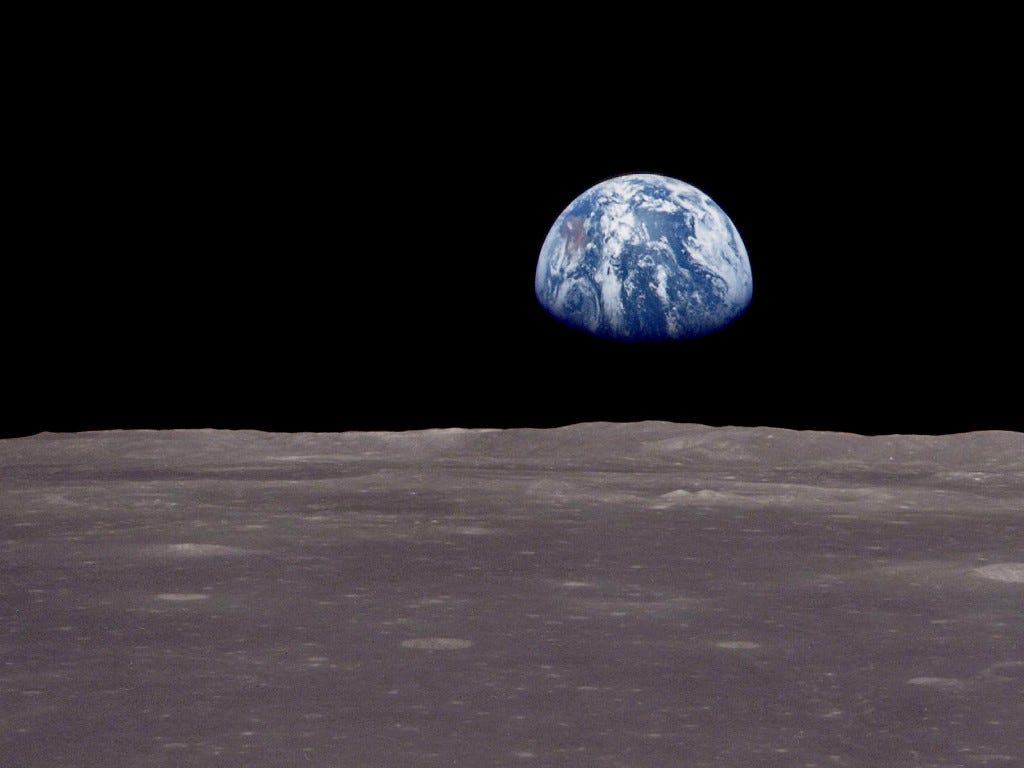The Moon and the humanitarian patriotism of John Stewart’s Americana
Oh, Mother Country, I do love you…

From the somewhat unlikely cocoon of The Kingston Trio, John Stewart (not to be confused with comedian “Jon”) emerged in the late 1960s to become one of the preeminent songwriters* in the movement that has come to be labeled “Americana.” Although it’s true that, in many ways, Americana can be considered just another word for “folk music,” there is a subtle distinction in its meaning, and it is especially appropriate as applied to the songs of John Stewart. At a time (maddeningly reminiscent of current days) when bumper stickers blared “America — love it or leave it!,” Stewart — who toured with Robert Kennedy’s final campaign — wrote of a heartfelt and unabashed love for America based not on waving flags but waving wheatfields, and the promise and possibilities of wind-swept prairies and wind-weathered people. (“Wind” was one of his favorite images.)**
Caryl and I grew up on those prairies. In the spring of 1969, having graduated together from our midwestern college (we were married the following December), we headed west to spend the summer in my home town, Rapid City, South Dakota, looking forward to one of our favorite pursuits: driving aimlessly through the backroads and valleys of the Black Hills, stopping here and there to attempt to find our way up a mildly-challenging granite crevice. And those backroads and mountain curves were always accompanied by music. In a time when one could still make a discovery by flipping through music store bins, I was doing just that at Haggerty’s in Rapid City when I found John Stewart’s album (in cassette form) — “California Bloodlines.” I recognized Stewart from the Kingston Trio days (I’m afraid I was a KT nerd), and snapped it up. It became the soundtrack of our summer. And, it turns out, not just ours…

Even more memorable — in that summer of 1969 — than discovering John Stewart’s music was sitting in my parents’ living room on July 20 watching the landing of Apollo 11’s lunar module, with Armstrong and Aldrin’s momentous walk. And so, a segue and an aside: I have eagerly viewed many of the movies and documentaries released in anticipation of the 50th anniversary of the launch. (That’s today! — as I write.) The best, in my opinion, and the one I suggest if you are going to watch just one, is the CNN Films documentary, “Apollo 11.” I learned many things watching that film, one of which is that Buzz Aldrin had also just discovered John Stewart! Stewart’s “Mother Country” (from “California Bloodlines”) was on Aldrin’s “mix-tape” and was playing in the Command Module as they headed back to Earth. The documentary film-makers heard this in the background of some archival footage, and included the song in the movie’s soundtrack.
“You know, there was just a lot of people
Who were doin’ the best they could.”
The good old days…
Were just a lot of people doin’ the best they could.
And they did it pretty up and walkin’ good!
Who were doin’ the best they could.”
The good old days…
Were just a lot of people doin’ the best they could.
And they did it pretty up and walkin’ good!
Oh, mother country, I do love you.
Oh, mother country, I do love you.
Oh, mother country, I do love you.
The “Mother Country” on Aldrin’s tape was not about space flight, but about a kind of American spirit exhibited in historical situations like the Johnstown Flood. The film-makers edited the lyrics for use in the soundtrack. You can hear Stewart’s whole song here: “Mother Country.”
A few years later, Stewart did, in fact, record a song about Apollo 11 — as an experience not just for America but for Earth. “Armstrong” is a lump-in-the-throat ode to humanity’s achievement of reaching the Moon, and, at the same time, a pensive reflection on the lives of those left behind as the Saturn rocket blasted skyward. The song, while marveling at what has been done, is not proclaiming “We’re number one!” but rather, as has often been remarked about the famous image of the Earth from the moon, “We’re all in this together.”
On this anniversary occasion, I hope you will listen to John Stewart’s rendition of this thoughtful song, “Armstrong.” I close this homage to that day, those guys, and John Stewart, by including his complete lyrics.
Black boy in Chicago
Playing in the street;
Not enough to wear,
Not near enough to eat.
Don’t you know he saw it
On a July afternoon —
Saw a man named Armstrong
Walk upon the moon.Young girl in Calcutta
Barely eight years old;
Flies that swarm the market place
Will see she don’t get old.
Don’t you know she heard it
On that July afternoon —
Heard a man named Armstrong
Had walked upon the moon.Rivers are getting dirty,
The wind is getting bad;
War and hate are killing off
The only earth we have.
But the world all stopped to watch it
On that July afternoon —
Watched a man named Armstrong
Walk upon the moonAnd I wonder if a long time ago,
Somewhere in the universe,
They watched a man named Adam
Walk upon the earth.

____________________________________________________
*Preeminent, but perhaps you’ve never heard of John Stewart. He was a “songwriters’ songwriter.” His own albums are classics of Americana and folk, yet always stopped short of actual fame. (The Rolling Stone named “California Bloodlines” one of the 200 most important albums of all time.) The Monkee’s made a hit of his “Daydream Believer,” and Roseanne Cash recorded his “Runaway Train.” Stewart died in 2008, at the age of 68.
**I wrote about John Stewart’s ballad of a midwestern childhood, “The Pirates of Stone County Road,” here.






